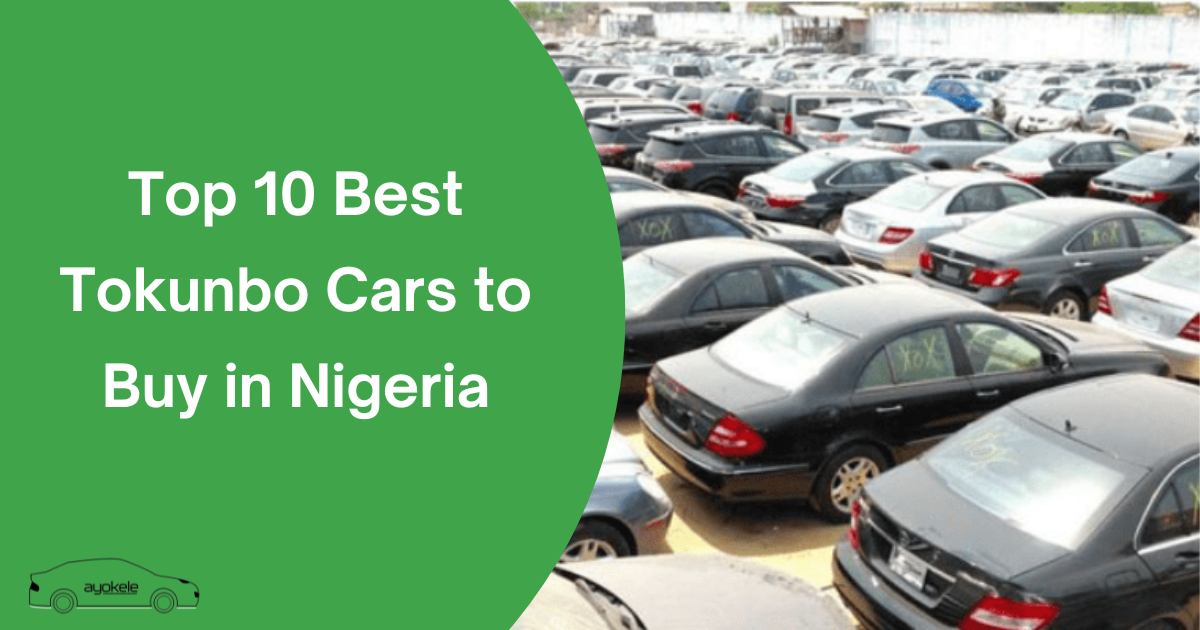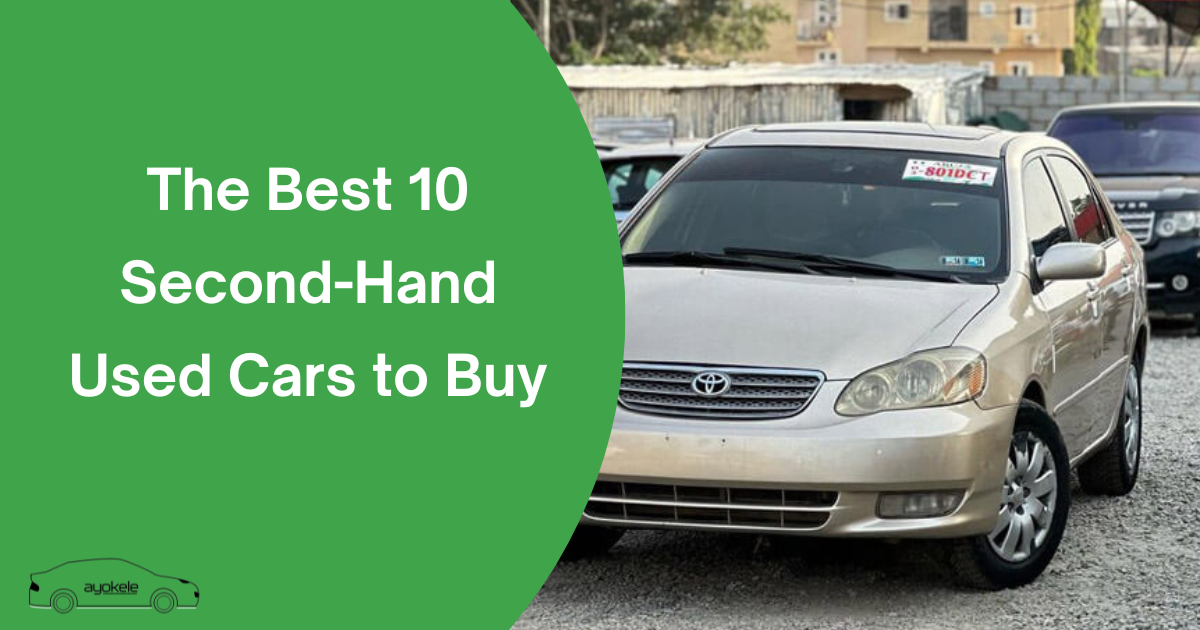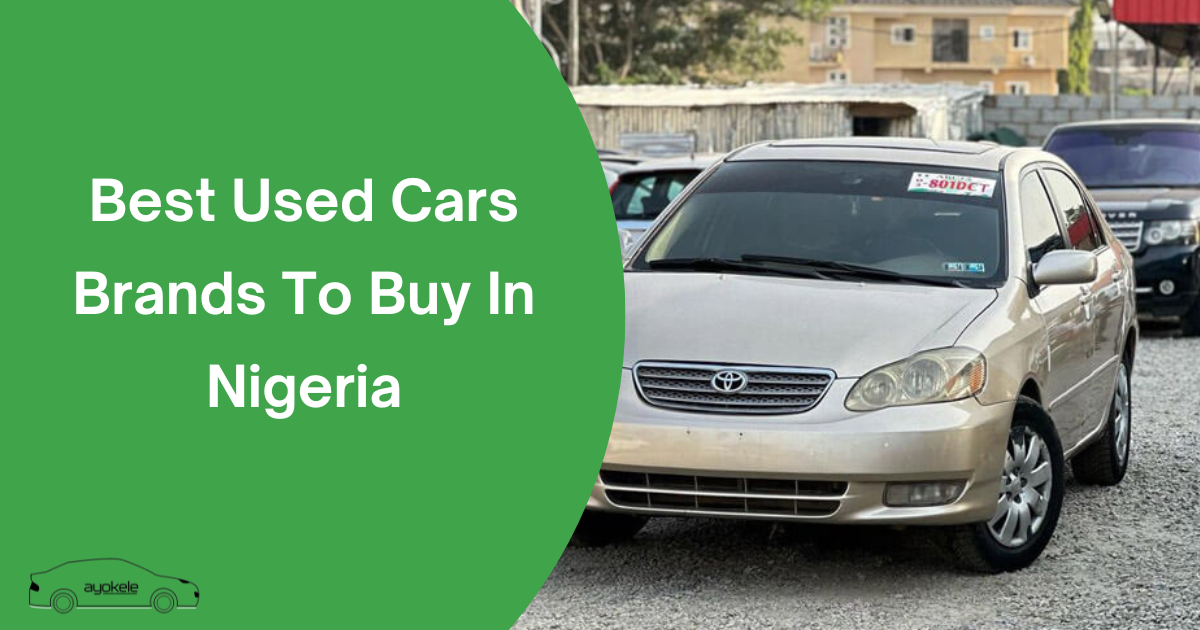The Nigerian automotive market has witnessed a significant surge in demand for Tokunbo (foreign-used) vehicles in recent years. As economic realities continue to shape consumer choices, these pre-owned imports have become the go-to option for many Nigerians seeking reliable transportation without the premium price tag of brand-new vehicles. Their popularity stems from offering a sweet spot between quality and affordability that locally used cars often fail to match.
For prospective car buyers in Nigeria, Tokunbo vehicles represent a practical investment that balances immediate accessibility with long-term value. This article aims to guide you through the top 10 best Tokunbo cars available in the Nigerian market, carefully selected based on their affordability, proven durability on Nigerian roads, and reasonable maintenance costs—three critical factors determining a satisfying ownership experience in the country’s unique driving conditions.
Factors to Consider When Buying a Tokunbo Car
When venturing into the Tokunbo car market in Nigeria, several critical factors should guide your decision-making process beyond just the initial purchase price. Understanding these factors can help you make an economical and reliable investment throughout your ownership period.
- Reliability: The reliability of a vehicle refers to how consistently it performs its intended functions without failure over time. This becomes especially important in Nigeria, where road conditions can be challenging and stress vehicles more. Models with proven track records of durability often feature robust suspension systems, sturdy body construction, and engines designed to withstand frequent use. When researching reliability, look beyond manufacturer claims and investigate the real-world experiences of other Nigerian drivers who have owned the model for several years.
- Fuel Efficiency: With fluctuating fuel prices in Nigeria, a vehicle’s fuel consumption rate can significantly impact long-term ownership costs. Fuel-efficient cars help you save money daily, especially if you commute regularly in traffic-congested areas like Lagos or Abuja. Modern vehicles with smaller displacement engines (1.4-2.0 liters) often deliver better economy without sacrificing necessary power. Consider that fuel efficiency isn’t just about engine size—proper maintenance, driving habits, and tire pressure all contribute to real-world consumption rates.
- Availability of Spare Parts: This consideration is frequently overlooked but becomes crucial when your vehicle eventually needs repairs. Cars with readily available spare parts in the Nigerian market save you from lengthy downtimes and expensive importation costs. Japanese and Korean models typically excel in this category, with extensive networks of original and quality aftermarket parts available nationwide. Before purchasing, visit local parts markets to confirm availability and comparative pricing for common replacement items like filters, brake pads, and suspension components.
- Price Range: Your budget ultimately determines your options, but understanding the true cost of ownership requires looking beyond the initial purchase price. Different vehicle segments offer varying value propositions—compact cars generally cost less upfront and consume less fuel, while SUVs provide versatility but at higher purchase and maintenance costs. Create a comprehensive budget for registration fees, insurance premiums, and potential immediate maintenance needs. Remember that extremely low-priced vehicles often hide expensive underlying issues.
- Maintenance Costs: Regular maintenance ensures your vehicle remains reliable, but these recurring expenses vary significantly between makes and models. Some European vehicles, while prestigious, often require specialized tools and expertise that command premium service rates in Nigeria. Conversely, popular Japanese models benefit from widespread mechanical familiarity and competitive service pricing. Research typical maintenance schedules and associated costs, paying particular attention to major service intervals (like timing belt replacements) that can represent significant periodic expenses.
Top 10 Best Tokunbo Cars to Buy in Nigeria
1. Toyota Corolla
Many Nigerians buy Tokunbo cars, and the Toyota Corolla is their first choice. People love it because it lasts a long time and rarely breaks down. If you buy a Corolla made between 2003 and 2017, you’ll get a car that can handle roads well. Its engine, electrical parts, and suspension stay strong even when the roads are bad.
What makes the Corolla special in Nigeria is how easy it is to own. You can find mechanics who know how to fix it everywhere. Spare parts are easy to find and not too expensive. It also uses less fuel – about 7-9 liters for every 100km of driving. The 1.8-liter engine gives you good power without using too much fuel. Even though the inside isn’t fancy, the seats and dashboard aren’t easily damaged in Nigeria’s hot weather. This helps the car keep its value when you want to sell it later.
2. Honda Accord
Nigerians call the Honda Accord “Discussion Closed” because once you buy it, there’s nothing more to discuss – it’s that good! The Accord drives smoothly through traffic and costs a reasonable amount to maintain. It handles better than other similar-sized cars because Honda made sure the suspension system (especially in older models) works really well. The engine runs smoothly, and the inside is designed to keep you comfortable even on long trips between cities.
The Accord is perfect for rural roads because it sits higher off the ground, so you don’t damage the bottom when you hit potholes. The air conditioning keeps working well even after many years in hot weather. What really makes the Accord special is its reliable electrical system. This matters a lot in Nigeria, where power problems can damage car electronics while charging. Replacement parts for electrical systems can be expensive, but the Accord rarely needs them. Accord models from 2008-2012 give you the best value for your money in today’s Tokunbo market.
3. Toyota Camry
The Toyota Camry is special in Nigeria because it works as a family car and as a car that shows you’re doing well in life without being too flashy. What’s great about the Camry is that whether you buy an older model (2002-2006) or a newer one (2007-2011), they’re all built similarly. This means repair procedures are similar and easier.
When you look at how the Camry handles challenges, you’ll see why people love it. The suspension does a great job handling both good and bad roads, staying smooth even when you suddenly drive from paved roads to unpaved ones in developing areas. Most importantly for Tokunbo buyers, the Camry’s engine can handle inconsistent maintenance that sometimes happens when parts aren’t available or when money is tight. Engines often last beyond 300,000 kilometers, even with just basic care. This forgiveness—plus the fact that most Nigerian mechanics know how to fix Camrys—makes owning one stress-free.
4. Lexus RX
When you want a luxury Tokunbo car in Nigeria, the Lexus RX offers the best balance of fancy features and practical engineering. Unlike many European luxury cars that cost too much to maintain, the RX is based on Toyota parts, so it’s sophisticated without being too complicated. The best thing about driving an RX in Nigeria is how it handles different road conditions. Whether on a smooth expressway or a rough rural road, its special suspension system constantly adjusts to keep your ride comfortable.
For several reasons, the RX deserves its place among Nigeria’s top Tokunbo cars. First, its engine—especially in the 330 and 350 models—gives you enough power while still being reliable, even when using lower-quality fuel. Second, the materials inside the car resist aging from Nigeria’s strong sunlight, so they look and feel good for many years longer than competitors. Finally, the RX shares many parts with other Toyota/Lexus models common in Nigeria. This means you can often use parts from different models, making maintenance much simpler and cheaper than European luxury cars that might look just as impressive but cost much more to keep running.
5. Nissan Altima
The Nissan Altima is like a hidden gem in the Tokunbo market—a car that gives you surprising quality without the high price of more popular options. The Altima is especially good for drivers because of its special transmission (CVT) in 2007-2012 models. This helps save fuel during long periods stuck in traffic in Lagos, Abuja, and Port Harcourt. With fuel prices increasing, you’ll spend less money running your car.
Under the Altima’s simple-looking exterior is a car designed with features that work perfectly for Nigerian drivers. The electrical system has strong protection against power surges, which is important in areas where unstable electricity can damage car electronics during charging. Also, the Altima has excellent sound insulation that keeps the inside quiet, whether driving in noisy city centers or on rural highways. For practical Nigerian buyers who want the best value without giving up comfort or reliability, the Altima—especially with the four-cylinder engine—gives you sophisticated engineering without the worry that often comes with owning fancier cars in Nigeria’s challenging environment.
6. Hyundai Elantra
These newer Elantras have stylish designs that still look good years after they were made, with flowing lines and sporty proportions that make them desirable across all social classes in Nigeria. Behind the Elantra’s flashy looks is real quality, thanks to Hyundai’s big improvement in 2010. This complete engineering upgrade created reliable engines while using only about 6.5 liters of fuel per 100km in typical Nigerian driving—efficiency that directly means lower running costs. What really cements the Elantra’s place among Nigeria’s best Tokunbo cars is Hyundai’s smart development of parts distribution networks throughout West Africa. This has greatly improved parts availability while keeping prices reasonable. For Nigerian buyers who want modern styling without compromises, the Elantra offers perhaps the best combination of good looks, modern technology, and practical ownership currently available in mid-range Tokunbo cars.
7. Kia Sportage
This compact SUV gives you the high driving position Nigerians love plus practical storage space but without the huge fuel consumption of larger SUVs. The 2010-2016 Sportage models are especially good, combining modern styling with improved build quality after Kia’s major design overhaul.
What makes the Sportage perfect for rough roads is its well-designed suspension system that handles unpaved roads, speed bumps, and potholes without breaking down. The ground clearance is high enough to clear obstacles but not so high that the car feels unstable when turning. Owners particularly praise the Sportage’s air conditioning system, which cools the cabin quickly even in the hottest weather. Parts availability has improved greatly in recent years as more Kias have entered the market. For buyers who want SUV practicality without paying for a Toyota or Honda badge, the Sportage offers excellent value while still delivering reliability where it matters most.
8. Volkswagen Passat
The Volkswagen Passat brings German engineering to Nigeria’s roads at a price many professionals can afford. Unlike its more expensive German cousins (Mercedes and BMW), the Passat delivers similar build quality and driving feel without the premium price tag. The 2006-2012 models are particularly good buys in today’s market, offering modern features with now-reliable technology.
What surprises many first-time Passat owners is how solid the car feels—doors close with a satisfying thunk, and road noise stays outside where it belongs. The interior materials adapt well to the harsh sunlight, and the seats remain comfortable even after years of use. While parts are more expensive than Japanese alternatives, they need replacement less often. The Passat is best suited for buyers who primarily drive on paved roads in urban areas, as its lower ground clearance makes it less ideal for rough rural roads. For the discerning professional who appreciates refined driving dynamics and interior quality, a well-maintained Tokunbo Passat offers European luxury without the shocking maintenance costs of more prestigious German brands.
9. Mazda 3
The Mazda 3 is a fun choice for drivers who enjoy driving but still need a practical car. Unlike many economy cars that feel boring, the Mazda 3 (especially 2009-2013 models) corners eagerly and accelerates smoothly, making even daily commutes more enjoyable. The steering feels direct and responsive, helping you confidently navigate tight Lagos traffic.
Beyond its enjoyable driving experience, the Mazda 3 offers excellent fuel economy—typically around 7.5 liters per 100km in mixed driving conditions. The interior quality is noticeably better than many competitors, with soft-touch materials and intuitive controls. Parts availability has improved significantly in recent years, especially in major cities, though you’ll still find more Toyota parts in rural areas. The Mazda 3’s only real weakness in the context is its somewhat limited ground clearance, making it better suited to urban environments with reasonably maintained roads. For younger professionals who want a car that expresses personality while remaining practical, a Tokunbo Mazda 3 hits the sweet spot between enjoyment and sensible ownership costs.
10. Ford Explorer
The Ford Explorer rounds out our list as the most rugged option, perfect for Nigerians who need a serious SUV for challenging conditions. With its substantial ground clearance, available four-wheel drive, and robust construction, the Explorer handles rough rural roads better than most competitors. The 2006-2010 models offer value, balancing modern features with simpler, more reliable technology.
What makes the Explorer stand out is its generous interior space. With three rows of seats available in most models, it’s perfect for large families or business owners who need to transport people and goods. The air conditioning system is powerful enough to cool the entire cabin quickly, even in the hottest regions. While fuel consumption is higher than other vehicles on our list (expect 12-14 liters/100km), the Explorer compensates with exceptional durability and off-road capability. Parts availability has improved in recent years through specialized Ford dealers, though prices remain somewhat higher than Japanese alternatives. For people who regularly travel to rural areas or need maximum cargo and passenger capacity, a well-maintained Tokunbo Explorer off
Tips for Buying a Tokunbo Car
1. Inspect thoroughly before purchase: Always examine the car in daylight. Check for rust underneath, uneven paint that might indicate repairs, and signs of water damage inside. Test drive the car to listen for unusual noises and feel how it handles. If possible, bring a trusted mechanic with you who can spot problems you might miss. Pay special attention to the engine condition, transmission smoothness, and electrical systems.
2. Verify the vehicle’s history and documentation: Request the Vehicle Identification Number (VIN) and run a history check online. Ensure all import documents are complete and authentic. Check that the engine and chassis numbers match those on the registration documents. Also verify that the appropriate customs duties were paid, as vehicles with incomplete documentation can cause legal headaches later.
3. Test all electronic components: Nigerian climate and road conditions can be harsh on vehicle electronics. Test everything – the air conditioning, power windows, central locking, entertainment system, dashboard displays, and all lights. These components can be expensive to repair, so knowing their condition helps you negotiate a fair price or budget for necessary repairs.
4. Consider ongoing maintenance costs: Research the availability and cost of spare parts for your preferred model. Some foreign cars look affordable initially but become expensive to maintain because their parts are scarce in Nigeria. Japanese and Korean vehicles generally have better parts availability and more affordable maintenance. Also consider fuel efficiency, as this impacts your long-term ownership costs.
5. Negotiate based on actual conditions: Don’t accept the first price offered. Point out any defects you’ve found and use these as negotiation points. Research current market prices for similar vehicles before making an offer. Be prepared to walk away if the seller won’t budge on an unreasonable price – always more cars are available. Consider the cost of immediate repairs when calculating your maximum offer.
Buying a Tokunbo car gives you good value for your money. These cars are affordable, reliable, and easy to maintain with parts you can find locally. Choose a car from our list based on what matters most to you – fuel savings, durability, or comfort.
Take your time when shopping, check the car thoroughly, and verify all documents. While no used car is perfect, following our tips will help you find a Tokunbo vehicle that serves you well for years without breaking your budget.




